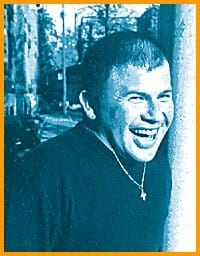William Granados is back in Canada, and this time he’s here for good.
He arrived in Toronto the end of October, this time with a minister’s permit, which allows him to stay in the country indefinitely.
Thanks to missing paperwork and a battery of blood tests, it took more than two years for him to get back.
Granados, 37, had been deported back to Venezuela in June 1999 after living in Canada for almost five years. Immigration officials didn’t accept his claim that he was a refugee on the basis of sexual orientation.
While living in Venezuela, Granados said that he was called names, harassed and assaulted because he’s gay. Officials said his homosexuality was a “fabrication.” During his time in Canada Granados volunteered with the AIDS Committee Of Toronto and the Coalition Against Homophobia, but his refugee board described him as “uncomfortable” with other gay men.
After much work by Granados’s lawyer, El-Farouk Khaki, Ottawa finally changed its mind. It agreed to accept him on humanitarian and compassionate grounds in November 2000. The government uses these grounds in special circumstances for individuals they don’t want to process as refugees or immigrants.
It’s taken Granados the past year to make his way back.
Granados says he spoke with Canadian officials in Caracas last November, but was told they hadn’t received any information. He didn’t hear back from them until May.
“I was told to come to Caracas with my papers and ID,” he says. When he made the four-hour trip from Margarita Island, where he was living, he was told that not only was the embassy missing some papers, he was also required to take a number of blood tests.
The samples had to be sent to Trinidad for testing; the results didn’t arrive for six weeks. They came back clean, and Granados thought he was home free. He returned to Caracas, expecting to receive information on his return to Canada, only to be told that he needed more tests.
When the second set of tests came back, he returned again to Caracas, only to be told that a third battery of tests was required. They wanted to find out the level of hepatitis vaccine he had received in Canada and they wanted him to take another HIV test – despite the fact that the previous two had come back negative.
At first, his Toronto friend Ricardo Rodriguez expected him home by Christmas 2000. Then March, then Pride Day as obstacles kept popping up. Throughout the ordeal, Granados was in daily contact by phone or e-mail with Rodriguez.
Rodriguez, a former Miss Hola, met Granados in the mid 1990s when they were both members of the gay Latino group Hola. Rodriguez has helped raise $4,000 for Granados’s case though community fundraisers.
“It’s a testament to William’s personality. He made a lot of friends when he was here,” says Rodriguez, who says that Liberal MPP George Smitherman and Toronto Centre-Rosedale MP Bill Graham were instrumental in Granados’s return.
He also says that for Granados to make so many trips to Caracas for the paperwork was taking a risk.
“Caracas is a dangerous city,” says Rodriguez.
Granados had to repay the government for his own deportation, and pay for his medical costs in addition to purchasing his minister’s permit, which all cost about $2,100.
Granados is currently waiting to get his landed immigrant status. That status depends on the results of the medical tests, which are now missing. Officials say they could be in Trinidad, Venezuela, Ottawa or Calgary.
A welcome home party for Granados is being held at the Croissant Tree (625 Church St) Fri, Nov 16 at 10pm.

 Why you can trust Xtra
Why you can trust Xtra


